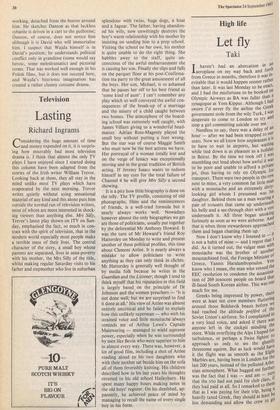Television
Lasting
Richard Ingrams
consiconsidering the huge amount of time dering money expended on it, it is surpris- ing how miserably bad most television drama is. I think that almost the only TV plays I have enjoyed since I started doing this column have been adapted from the stories of the Irish writer William Trevor. Looking back at them, they all stay in the mind unlike most TV plays which have evaporated by the next morning. Trevor writes quietly without using sensational material of any kind and this alone puts him outside the normal run of television writers, most of whom are more interested in shock- ing viewers than anything else. Mrs Silly, Trevor's latest play shown. on ITV on Sun- day, emphasised the fact, so much in con- trast with the spirit of television, that in the modern world especially most people make a terrible mess of their lives. The central character of the story, a small boy whose parents are separated, lives in semi-poverty with his mother, the Mrs Silly of the title, whilst making regular Saturday visits to his father and stepmother who live in suburban splendour with twins, huge dogs, a boat and a Jaguar. The father, having abandon- ed his wife, now unwittingly destroys the boy's warm relationship with his mother by insisting on sending him to a prep school. Visiting the school on her own, his mother is quite unable to do the right thing. She babbles away to the staff, quite un-
conscious of the awful embarrassment she
is causing her son. Finally she slips and falls on the parquet floor at his post-Confirma- tion tea party to the great amusement of all
the boys. Her son, Michael, is so ashamed that he passes her off to his best friend as 'some kind of aunt'. I can't remember any
play which so well conveyed the awful con- sequences of the break-up of a marriage and the misery of a child caught between two homes. The atmosphere of the board- ing school was extremely well caught, with James Villiers giving us a wonderful head- master. Adrian Ross-Magenty played the small boy without putting a foot wrong. But the star was of course Maggie Smith who must now be the best actress we have. Her portrayal of a woman totally lost and on the verge of lunacy was exceptionally moving and in the great tradition of British acting. If Jeremy Isaacs wants to redeem himself in my eyes for the total failure of Channel 4 he will give Mrs Silly a second showing. It is a pity how little biography is done on the telly. The TV profile, consisting of old photographs, films and the reminiscences of friends, is a well-tried formula but it nearly always works well. Nowadays however almost the only biographies we get are those of politicians, usually put together by the deferential Mr Anthony Howard. It was the turn of Mr Howard's friend Roy Hattersley on Monday to write and present another of these political profiles, this time about Clement Attlee. It is nearly always a mistake to allow politicians to write anything as they can only think in cliches. Mr Hattersley is generally well thought of by media folk because he writes in the Guardian and the Listener, though I tend to think myself that his reputation in this field is largely based on the principle of Dr Johnson and the women preachers — 'It is not done well; but we are surprised to find it done at all.' His view of Attlee was almost entirely uncritical and he failed to explain how this unlikely superman — who with his strained voice and little moustache always reminds me of Arthur Lowe's Captain Mainwaring — managed to wield supreme power, especially when he was surrounded by men like Bevin who were superior to him in almost every way. There was, however, a lot of good film, including a shot of Attlee reading aloud to his two daughters who with their mother sat beside him on the sofa all of them feverishly knitting. His children described how in his last years his thoughts reverted to his old school Haileybury. He spent many happy hours making notes in the old boys' register. On his deathbed, ap- parently, he achieved peace of mind by managing to recall the name of every single boy in his form.






































 Previous page
Previous page